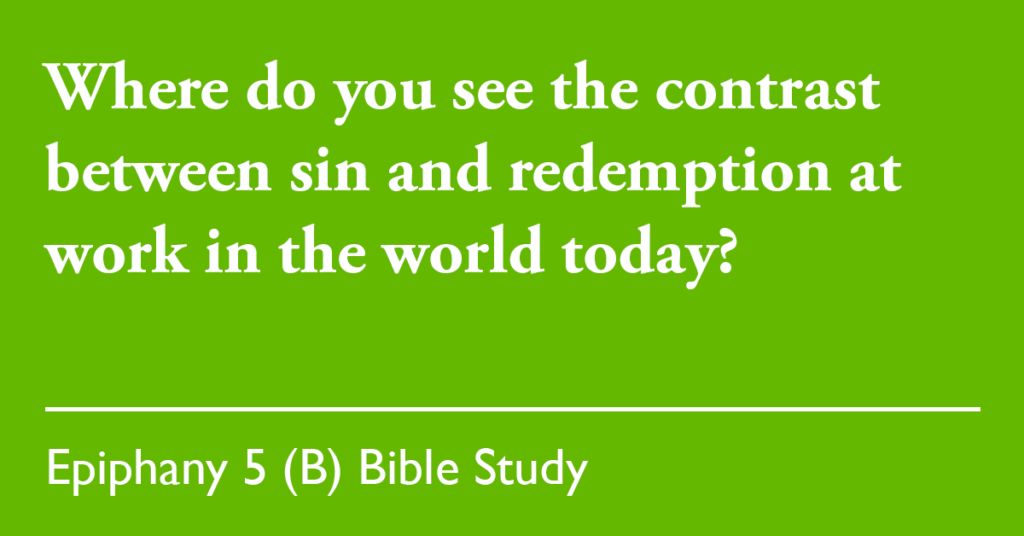This page is available in: Español
Bible Study: Epiphany 5 (B) – February 4, 2024
February 04, 2024
RCL: Isaiah 40:21-31; Psalm 147:1-12, 21c; 1 Corinthians 9:16-23; Mark 1:29-39

Isaiah 40:21-31
In Isaiah 39, the prophet gave Yahweh’s judgment to King Hezekiah: Judah would soon be overtaken by Babylon. After this ominous message, the second major section of Isaiah, known as the Book of Comfort, begins. This section of Isaiah includes chapters 40 through 66. Our reading occurs in the opening paragraphs of the Book of Comfort. Here, the image of God’s majesty is presented through poetry. For those who had heard Isaiah’s prophecy, this poetry would have offered a contrasting view of Yahweh: the consoling deliverer.
- In this passage, Isaiah responds to the harsh judgment of Yahweh (Isa. 39) with contrasting imagery. Where do you see the contrast between sin and redemption at work in the world today?
Psalm 147:1-12, 20c
Psalms 146 – 150 form a collection known as The Endless Hallelujah. Psalm 147:1 invites the community of Israel to praise Yahweh. Verses 2 – 6 describe Yahweh’s good works. Verses 7 – 11 repeat the cycle: in verse 7, the invitation to praise, and in verses 8 – 11, the reasons to praise Yahweh. For thousands of years, this Psalm has reminded us to praise God, from whom all blessings flow.
- In our busy lives, pausing to praise Yahweh may be difficult. How might our lives be affected by creating space and time for daily worship?
1 Corinthians 9:16-23
Paul proclaimed the gospel with no expectation of payment or other earthly reward. Corinth was a society in which success was known by wealth, power, and prestige. Paul sets himself apart from secular recognition: the gospel is God’s message of grace and Paul will do whatever is necessary to bring the message to all of God’s people. God’s abundant grace is available to the weak, the slave, the citizen, the Jew, and all others in Corinth. This must have been a peculiar message in a city that prized status.
- Many of us live in societies like Corinth. As Christians, our daily walk in the world is an opportunity to proclaim the gospel. What is the gospel message we are communicating?
Mark 1:29-39
This passage continues to reveal the healing power of Jesus. For those in Galilee, rumors were traveling quickly about the healer. People were coming to see him. Jesus retreats from the village of Capernaum to pray alone. He is found by his disciples, who encourage him to return. But Jesus announces that it is time for him to travel throughout Galilee to proclaim the message, “Because that is why I came.” Throughout this gospel, making the good news accessible to the Gentiles is a consistent rhetorical message. In verse 38, Mark makes clear that proclaiming God’s message was Jesus’ reason for being in their midst.
- Living conditions in Galilee were primitive. Suddenly, Jesus moves among them—and he is able to heal the un-healable. Surrounded by people needing his divine touch, Jesus retreats to pray alone. When the world presses upon us, the example of Jesus suggests that we should intentionally hit the “pause” button and spend time praying. What benefits do you see in choosing to follow Jesus’ example? What challenges do you see?
This Bible study was written by Paula Jefferson for Epiphany 5 in 2018.
This page is available in: Español
Don’t forget to subscribe to the Sermons That Work podcast to hear this sermon and more on your favorite podcasting app! Recordings are released the Thursday before each liturgical date.
Receive Free Weekly Sermons That Work Resources!
This page is available in: Español


